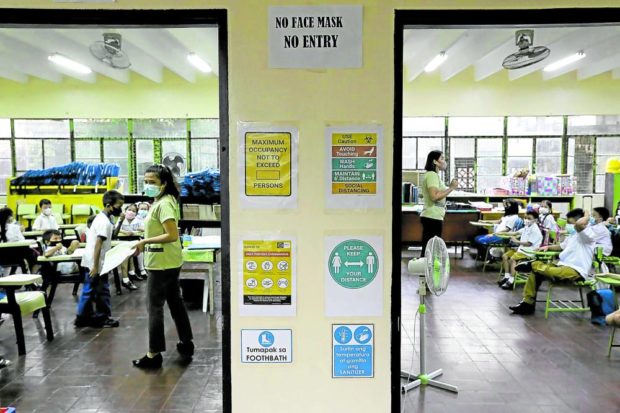
SIGNS OF OUR TIMES | Reminders on how to prevent the spread of COVID-19 are posted on classrooms at Aurora Quezon Elementary School in San Andres, Manila, following the resumption of in-person classes on Monday after two years of health and mobility restrictions due to the pandemic. (Photo by RICHARD A. REYES / Philippine Daily Inquirer)
MANILA, Philippines — Reported COVID-19 cases in campuses, as already confirmed by the Department of Education (DepEd), are a result of its “negligence” and “poor health measures,” the Alliance of Concerned Teachers (ACT) said on Monday.
The group noted the confusion of regulations in campuses whenever a COVID-19 case is reported.
“Teachers who have taught in a class where there was a positive case are still required to teach in other sections. Then those who have symptoms or exposure need to spend for the RT-PCR (reverse transcription-polymerase chain reaction) test [so their absence can be] excused… because [this] might be deducted from their salary,” ACT chair Vladimer Quetua said.
Most teachers, he said, do not have sick leave credits.
Confirming that there were coronavirus cases in schools, lawyer Michael Poa, DepEd spokesperson, said this development was “expected.”
“What we want to avoid, that’s why we’re closely monitoring [the situation], is to have a surge in COVID-19 cases,” he said in a press conference last Friday.
Through its Order No. 39, DepEd directed the schools to establish their own surveillance systems and coordinate closely with local health authorities.
But with that policy, “DepEd is absolved of any responsibility over infection in schools,” ACT said.
‘Recipe for disaster’
Quetua also noted that the department issued that order only recently—a “month into face-to-face [classes].”
DepEd’s guidelines are a “recipe for disaster,” ACT said of the agency’s earlier health protocols, because they only included such basic rules as the mandatory wearing of face masks, and did not previously specify, for instance, any standard for classroom ventilation apart from opening doors and windows.
Quetua said these measures must be strengthened as the education sector gets ready for full in-person classes by November.
“The government has to invest in the health and safety of our teachers and learners if it wants education to effectively recover through the 100 percent resumption of in-person learning,” he said.
Case update
Meanwhile, new COVID-19 cases fell to a seven-day average of 2,288, which is 10 percent lower than the previous week’s 2,556 daily average cases, according to the Department of Health (DOH).
Four severe or critical cases were admitted last week, bringing to 753 the number of coronavirus patients who are severely or critically ill.
While detected cases declined, COVID-19 deaths continued to rise as the DOH confirmed 228 more deaths that occurred between September this year and as far back as the same month a year ago.
The country’s official coronavirus death toll stood at 63,013 out of 3.95 million confirmed cases.
There are currently 28,872 active cases, or people still infected with the virus.
But the nationwide healthcare utilization rate remained at low risk, with 24.3 percent of ICU (intensive care unit) beds and 26.2 percent of non-ICU beds occupied.
So far, 73.1 million individuals have been fully vaccinated—or 93.7 percent of the vaccination target of 78.1 million individuals.
However, only 19.7 million individuals have availed themselves of booster shots.
Around 78.5 percent of the elderly population have completed their primary COVID-19 shots.
RELATED STORIES
DepEd confirms COVID-19 cases in schools
DepEd: Students who contract COVID-19 during in-person classes are excused
Wearing face masks in Central Visayas schools still mandatory – DepEd

